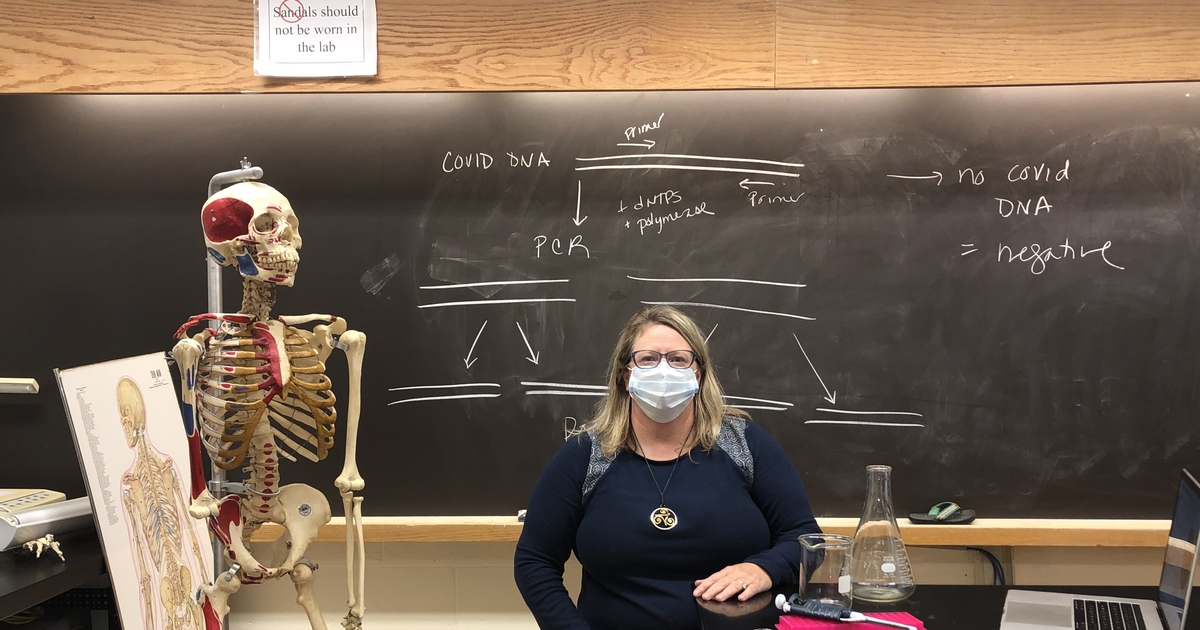Understanding the Science Behind COVID-19

Adjunct Lecturer Julie De Zutter knows what it’s like to teach a fluid curriculum.
Her popular Drug Development course at Babson College this year is all about the science—and complexities—of finding a cure for COVID-19. She uses the pandemic to infuse real-time data, and questions, into her course, and lets her students take the lead.
“Everything that we talk about on a daily basis is relevant to COVID-19, and students have so many questions and so many insights, and we relate virtually everything back to what is going on in the world,” she said.
COVID-19 affects everyone, especially college students who have been dramatically impacted, must act responsibly, and have a lot of questions—a prime atmosphere for learning.
“It’s been kind of an exciting time,” De Zutter said. “Number one, watching a pandemic play out scientifically is fascinating with all of the data that is coming out of it—economically and socially. You can’t sit still for a second without having something be outdated.”
This type of rapid change and uncertainty provides De Zutter with fertile ground for scientific inquiry.
Data-Driven Classroom
De Zutter, who recently won the Babson Adjunct Professor of the Year Award, recognizes the need to stay on top of the data and infuse it into her classroom and lab discussions, and she creates a learning environment that is both collaborative and experiential.
“Depending on what the particular topic of the day is, we all talk about the learning goals, and I give the students an overview of important things they need to think about,” she said. “Then, we split off into groups to discuss papers or brainstorm ideas.”
“They think of things that I would never think of—on a social level or a demographic level, or an out-of-the-box way—to solve a problem.”
Adjunct Lecturer Julie De Zutter
The focus always is on sound scientific processes. In science, and in the development of vaccines, De Zutter emphasizes, decisions have to be data-driven. “So, anything that the students think needs to be backed up with data—from reliable sources—which does not include BuzzFeed or Twitter,” she said.
And, she has found the students to be amazing data analyzers. “They think of things that I would never think of—on a social level or a demographic level, or an out-of-the-box way—to solve a problem,” De Zutter said. “And, they all brainstorm together, so they’re the real valuable assets in the class.”
“In the end,” De Zutter said, “there’s no book for this class, because any book, number one, isn’t written, and number two, is outdated if it is written.”
Leading the Way
One of her star students, Alicia Gaudet ‘22, recently won the Babson Outstanding Performance in Science Award—along with other top-performing students across disciplines.
“Professor De Zutter creates an engaging environment in which we debate crucial issues on a daily basis, which not only opens our awareness of these issues, but builds upon our communication skills,” Gaudet said. “And, everything that we do as it relates to the cure, we do as new information comes out, and we discuss it in class.”
Gaudet also emphasizes why the Drug Development course is important, and how it relates to entrepreneurial leadership.
“The pharmaceutical industry is filled with topics that don’t have an easy answer,” she said. “Entrepreneurial leaders should take this course to study the issues at hand in the industry, and try to think of possible solutions. It is an industry that is in need of entrepreneurial leaders.”
The Importance of Scientific Literacy
Once a COVID-19 vaccine is developed and approved, people will need to be able to make informed decisions.
“One of my main goals of the class is to really drive home to students that scientific literacy is really valuable in their lives,” De Zutter said. “And, you want to be able to make sure that you can discriminate between real information and information that is biased in a lot of different ways.”
She does this all while keeping an eye on the big picture so that her students—future entrepreneurial leaders—will be able to use this experience, whatever path they may choose.
“I want them to start to delve into some more particulars about what this really means in society, what this really means at this college campus,” De Zutter said, “and what this really means for the pricing of a vaccine that everyone in the world is going to need.”
Posted in Community



